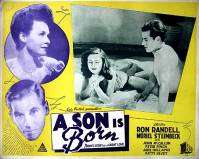A Son Is Born
| A Son Is Born | |
|---|---|
 Lobby card | |
| Directed by | Eric Porter |
| Produced by | Eric Porter |
| Written by | Gloria Bourner |
| Starring |
Ron Randell Peter Finch Muriel Steinbeck |
| Music by | Sydney John Kay |
| Cinematography |
Arthur Higgins Damien Parer (war photography) |
| Edited by | James Pearson |
Production company |
Eric Porter Studios |
| Distributed by | British Empire Films |
Release dates | 20 September 1946 |
Running time | 85 mins |
| Country | Australia |
| Language | English |
| Budget | ₤10,000[1] |
A Son Is Born is a 1946 Australian melodrama.
Synopsis
In 1920, Laurette marries an irresponsible drifter, Paul Graham. They have a son, David, but later divorce due to Paul's drinking and infidelities. David chooses to stay with his father and Laurette marries again, this time to John, a rich businessman with a teenaged daughter, Kay.
Years later Paul is killed in a car accident and David comes to live with his mother, John and Kay. To get revenge on his mother for "abandoning" his father, David seduces Kay into marriage and abandons her, but realises the error of his ways serving in New Guinea during World War II. He is injured in battle but survives to be reunited with Kay, Laurette and John.
Cast
- Muriel Steinbeck as Laurette Graham
- Ron Randell as David Graham
- Peter Finch as Paul Graham
- John McCallum as John Seldon
- Jane Holland as Kay Seldon
- Kitty Bluett as Phyllis
- Peter Dunstan as David Graham as a boy
Production
The script was written by Gloria Bourner, who was a cartoonist.[2] Eric Porter storyboarded the entire film prior to filming.[3] He also put up half the budget himself, with the balance coming from Charles Munro and some private investors.[4]
Peter Finch, Ron Randell, Muriel Steinbeck and John McCallum were all well established actors when the film was made. Jane Holland was a 22-year-old radio actor who later moved to England and married Leo McKern.[5] Kitty Bluett was a musical comedy star, the daughter of comedian Fred Bluett.[6]
The film was shot in the Supreme Sound System studio in early 1945. Filming was scheduled to allow the actors to take radio and stage jobs, and sometimes would start at midnight.[7] War footage shot by Damien Parer is used in the New Guinea sequences.[8]
The movie was shot prior to Smithy (1946), also starring Randell and Steinbeck, but its release was held off until after that bigger budget movie to take advantage of its publicity.
Reception
Ron Randell was mobbed by female fans at the film's premiere.[9] Critical response was mixed, many comparing the film unfavourably with Smithy.[10][11]
Porter announced he wanted to make another film with Finch, a ₤35,000 suspense drama set in the timber country near Dorrigo and Coffs Harbour called Storm Hill, but it never eventuated.[12][13]
References
- ↑ "£1,700,000 FILM." The Mail (Adelaide, SA) 7 Oct 1944: 8 accessed 12 December 2011
- ↑ "LOCAL INTEREST IN "A SON IS BORN"." Barrier Miner (Broken Hill, NSW) 6 Nov 1946: 7 accessed 12 December 2011
- ↑ "Sydney to Make Unusual Film." The Mail (Adelaide, SA) 2 Sep 1944: 16 accessed 12 December 2011
- ↑ Ken G. Hall, Directed by Ken G. Hall: Autobiography of an Australian Filmmaker, Lansdowne Press, 1977 p176
- ↑ "Studio's tribute to Sydney girl." The Australian Women's Weekly 11 May 1946: 28 accessed 12 December 2011
- ↑ "A GRAND LITTLE TROUPER." Advocate (Burnie, Tas) 14 Nov 1947: 7 accessed 12 December 2011
- ↑ "FILM PRODUCER GAZES & THINKS." Townsville Daily Bulletin (Qld) 2 Oct 1946: 4 accessed 12 December 2011
- ↑ Andrew Pike and Ross Cooper, Australian Film 1900–1977: A Guide to Feature Film Production, Melbourne: Oxford University Press, 1998, 203.
- ↑ "Fans Mob Actor At Australian Film Premiere." The Sydney Morning Herald 21 Sep 1946: 4 accessed 12 December 2011
- ↑ "New Australian Film Disappoints.". The Argus (Melbourne, Vic. : 1848 - 1956). Melbourne, Vic.: National Library of Australia. 20 January 1947. p. 4. Retrieved 19 August 2012.
- ↑ "NEW FILMS REVIEWED." The Sydney Morning Herald 23 Sep 1946: 5 accessed 12 December 2011
- ↑ ... 'Garden Notes World market opens to Australian Films', The Mercury (Hobart), Saturday 30 November 1946 Supplement: The Mercury Magazine p 3
- ↑ Script for Storm Hill at National Archives of Australia
External links
- A Son Is Born in the Internet Movie Database
- A Son is Born at National Film and Sound Archive
- Complete copy of script at National Archives of Australia
- A Son is Born at Oz Movies